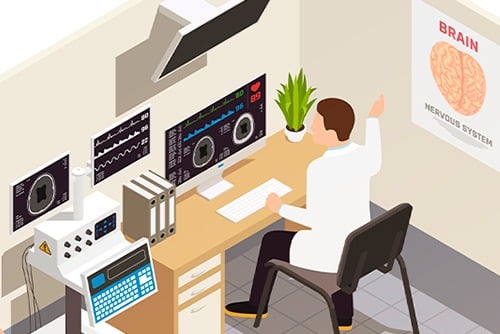The parents of Ali, a 6-month-old boy, visit Pediatric Neurology Clinic at KidsHeart Medical Center because they are concerned about some strange episodes he has been having over the previous three weeks. The episodes usually occur soon after he has woken but may sometimes happen as he is about to go to sleep. In these episodes his knees suddenly come up towards his chest, his arms bend at the elbows and his hands may clench. Each episode lasts a few seconds but they may occur repeatedly over many minutes. He is very upset after them.
Over the past two weeks Ali has become more irritable and has stopped showing any interest in his toys. His birth and perinatal period were normal. There is no family history of epilepsy.
Dr. Imad Yassin, Consultant Pediatric Neurologist suspects that Ali may have infantile spasms (West syndrome). Examination should include measurement of Ali’s head circumference, examination of his skin (to look for evidence of tuberous sclerosis) and a brief assessment of his development and visual behavior.
A video- EEG was carried immediately within 24 hours. Dr. Imad Yassin is always insisting that the EEG should be performed both the waking and sleeping state.
Ali should also have an MRI brain scan. Depending on the results of the MRI, additional investigations may be necessary, including blood, urine and cerebrospinal fluid (CSF) analyses Ali’s parents were given information on the reasons for these tests, their results and meaning.
Ali’s EEG shows hypsarrhythmia, the characteristic EEG patterns seen in infants with infantile spasms, thereby confirming that he has West syndrome.
The long-term developmental outcome of infants with West syndrome is primarily dependent on the underlying cause. However, because West syndrome is a type of ‘epileptic encephalopathy’, which means that the frequency of the spasms and the EEG appearance of hypsarrhythmia may adversely affect the long-term developmental outcome, it is important to treat infants as soon as the diagnosis of infantile spasms (West syndrome) is made.


